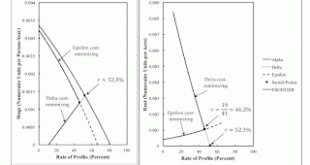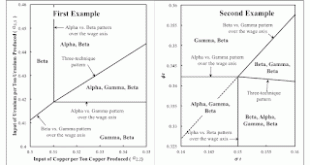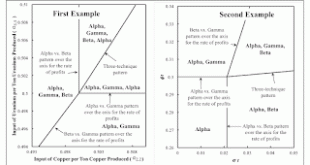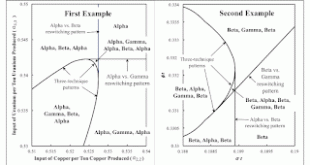Figure 1: The Wage Frontier And Rent1.0 Introduction This post is another worked homework example, problem 7.8 in Chapter 10 of Kurz and Salvadori (1995). The example illustrates the possible non-existence of a cost-minimizing technique with intensive rent. I once looked at an example from J. E. Woods of joint production. I claim that that example does not make the desired point, given the possibility of a price of zero for some produced good. I do not think this example of rent can be...
Read More »An Example Of External Intensive Rent From D’Agata
Figure 1: The Wage Frontier And Rent This post is merely a worked homework example, problem 7.10 in Kurz and Salvadori (1995). I have not considered yet which parameters I want to explore perturbing. As a matter of history, Anderson, West, Malthus, and Ricardo took extensive rent as the paradigm case, and confined it to land. They imposed no limit on the production of industrial commodities. Ricardo, at least, also discussed the case of intensive rent. The marginalists, on the other hand,...
Read More »Post-Sraffian Terminology
Terms that include the word 'pattern' are my own creation, as inspired by my research program. The remainder are, as far as I am concerned, standard terminology, some of which you would be introduced to if you were taught price theory properly. (Most of what is in mainstream microeconomic textbooks is, at best, wrong.) The definitions are my own, although obvious inspired by my reading. Absolute rent: A price paid for a year's services for land under cultivation due to barriers to entry to...
Read More »Elsewhere
[embedded content]Why Rationality is WrongAbove is a video by "Dr. Skeleman", first in a series. Nick Romeo, in The New Yorker, on The CORE textbook. Steve Keen's obituary of Janos Kornai. J. Barkley Rosser's comments on Kornai's passing. I feel I should have more to say. I recommend autobiography, By Force of Thought: Irregular Memoirs of an Intellectual Journey, although it is somewhat dry. J. Barkley Rosser's obituary of Peter Flaschel
Read More »Some Kinds Of Rent
Special Cases in the Analysis of Rent TypeLandAgricultural ProcessesIndustrial ProcessesExtensive rentMultiple types of land, each of a given qualityFor a given type of land, one process producing corn is availableFor a given commodity other than corn, one process for producing it is availableIntensive rent properOne type of homogeneous landFor the given type of land, multiple processes are available for producing cornFor a given commodity other than corn, one process for producing it is...
Read More »On David Card’s Nobel
The Sveriges Riksbank prize in economic sciences in memory of Alfred Nobel this year goes to David Card, Joshua Angrist, and Guido Imbens. I cannot say much about instrumental variables, Angrist, or Imbens. Since I have been pointing to Card's work with Alan Krueger on minimum wages for decades, I thought I might say somthing about his half of the prize. I do not have much new to say. I find both natural experiments and meta-analysis intriguing. Both Card and Krueger's natural...
Read More »A Structure in Parameter Space with Three Patterns Across The Wage Axis
Figure 1: Three Patterns Across The Wage Axis And One Three-Technique Pattern This post continues the approach in this post and in this post. As previously stated, I consider the same two examples. In both examples, three processes are known for producing the numeraire, called "corn". In the example for the left panel, corn is a non-basic commodity, and a different basic commodity is used in each of the three techniques. In the example for the right panel, all three corn-producing processes...
Read More »A Structure in Parameter Space With Three Patterns Across The Axis For The Rate Of Profits
Figure 1: Three Patterns Across The r Axis And One Three-Technique Pattern This post continues the approach in this post. I consider the same two examples. In both examples, three processes are known for producing the numeraire, called "corn". In the example for the left panel, corn is a non-basic commodity, and a different basic commodity is used in all three techniques. In the example for the right panel, all three corn-producing processes require inputs of labor power, corn, and labor (in...
Read More »Elsewhere
Alex Thomas on Krishna Bharadwaj as an ideal economist. Her daughter, Sudha Bharadwaj is a political prisoner. The first page of this Jeremy Rudd paper is getting noticed. A lot of mainstream economics is "arrant nonsense." National Public Radio has a rememberance of Charles Mills. Liam Bright has a tribute, too.
Read More »A Structure In Parameter Space
Table 1: A Common Structure Example1.0 Introduction This post presents partitions of (a part of) parameter space for two examples of models of prices of production with a choice of technique. The examples have a different structure and are parametrized differently. Yet, I want to argue, the partitions are the same, at some level of abstraction. 2.0 Thing 1 The first example is an instance of the Samuelson-Garegnani model. Table 1 presents the coefficients of production for this example....
Read More » Robert Vienneau: Thoughts Economics
Robert Vienneau: Thoughts Economics





